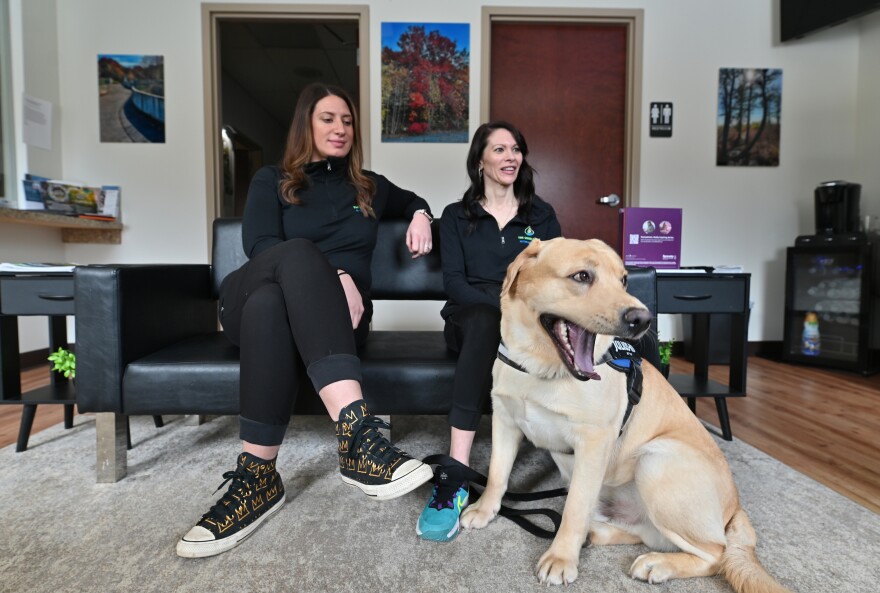Kyle Makavensky took psychiatric medications for 15 years. At most, he was on nine different prescriptions at once. He said he experienced negative side effects, to which his doctors would respond by upping his doses or prescribing another pill.
“It's just been hell. They had me thinking that the medicine took the hell away, but I think it brought it,” Makavensky said.
At 39, he decided to make a change.
His current psychiatrist suggested ketamine infusions to help him with the process of coming off his medications. He said the ketamine is already working better for him.
Makavensky is a patient at The Good Drop, a ketamine clinic in Avoca. He’s been receiving the infusions for about three months now. At first, he went twice a week. Now, he comes on a weekly basis for a 40-minute infusion. The ketamine helps him tamp down his anxiety and negative thought patterns.
“You get nothing, which is awesome. You get no anxiety. You get no bad thoughts. I don't feel anxiety. I left. I was joking with my parents. I was laughing about nothing. I felt stupid, but I felt good. That hasn't happened,” he said.

The Good Drop
The Good Drop opened in 2023. It’s co-owned by Kelly Wilson and Mara Capozzi, former emergency room nurses in the Commonwealth Health hospital system.
They saw emergency rooms overwhelmed by mental health patients and started thinking about more sustainable mental health treatment plans.
“As providers in the area in general, everybody feels overwhelmed,” Capozzi said. “Anything that we can do to take a little bit off everyone's plate and divvy it up. There's room for all of us here, because that's how destitute our area is with resources for people.”
According to Dr. Russell James II, who consults with patients for The Good Drop, ketamine has a higher rate of effectiveness than most antidepressants. He advocates for the treatment because it has fewer side effects than antidepressants.
“Another good thing about ketamine is it does its duty without hanging around in your body, like the antidepressants,” James said.
James identified three main groups that are good candidates for ketamine treatment: people with treatment-resistant depression, patients with chronic pain disorders such as fibromyalgia or traumatic injuries and patients with anxiety.
The Cleveland Clinic defines treatment-resistant depression as, “when at least two different first-line antidepressants aren’t enough to manage the condition during a depressive episode” over the course of at least six to eight weeks.
In Makavensky’s case, his insurance fully covers his infusions because so many previous psychiatric medications failed to treat his anxiety.
The Good Drop takes most forms of insurance, and they see a lot of out-of-state patients because of that, said Wilson.
Infusions are $400 if insurance can’t cover it. The clinic offers bundle plans to encourage patients to keep up with the treatment.
Ketamine’s legal status
Ketamine is a dissociative anesthetic, meaning it makes people feel separated from their bodies or physical environment. It’s legal in Pennsylvania for medical use.
Before the clinic opened, the state’s Department of Drug and Alcohol Programs identified 13 ketamine clinics in the state as of September 2022. One of the clinics was in Carbon County, but that was the only one in the Northeast part of the state at that time.

Ketamine is currently classified by the Drug Enforcement Administration (DEA) as a Schedule III drug. The DEA defines Schedule III drugs as having a, “moderate to low potential for physical and psychological dependence.”
The DEA acknowledges ketamine's potential for abuse and its prevalence as a "club drug."
However, it is FDA approved in nasal spray form as the prescription drug Spravato, which can be prescribed to patients with depression.
The Good Drop uses the drug off-label, according to James.
“Off-label medication means it's not specifically recommended for these conditions as of yet, because the FDA has not approved for these conditions,” James said. “However, you're able to use it off-label. The FDA won't come out and say it's definitely effective, because there's not enough studies on it that have been done.”
'We do have to be educated about it'
Stigma surrounding ketamine’s use to treat mental health comes from its history as a recreational drug, according to Dr. Dana Manning, an associate professor in Wilkes University’s Nesbitt School of Pharmacy.
Manning describes herself as a “hippie professor” and is interested in the development of unconventional treatments.
“Part of the the reason I get that reputation, a little bit, is because I'm not afraid to engage with topics and substances that do have a broader societal history,” Manning said.
She said ketamine’s stigma means it is not as well-researched as more mainstream antidepressants.
“Even though a lot of these drugs don't have the standard, big, randomized, controlled trials paid for by a big drug company behind them, that doesn't necessarily mean that they don't do anything,” Manning said.
Manning said the biggest risk with ketamine is with improper dosages and that most negative experiences come from chronic use, rather than one time use in a controlled environment.
“Ketamine’s side effect profile really depends on the dosage,” she said. “You can almost get the person too dissociated. They can go too far, which could lead to some potentially scary psychological feelings or symptoms for that patient, including a feeling of loss of control or delirium.”
She added that physical side effects with too high of a dose can include harm to the liver, hallucinations, difficulty urinating and trouble breathing.
Manning’s student Jaden Greco believes her generation of pharmacists will be more open to alternative treatments like ketamine.
“We have to try to break some type of stigma for patients who have gone through every single option and still nothing is working,” Greco said.
For her, it’s less about personal beliefs and more about protecting patients.
“Even if we personally don't agree with the form of medication, as pharmacists, we're going to have patients that are coming to us using psilocybin, ketamine, marijuana, and whether we agree with it or not, we do have to be educated about it,” Greco said. “There are interactions that can occur, side effects that can occur. Having an open mind and being educated and well rounded as a provider, I think it's just what's most important.”
‘Checks and balances’
The owners know there's a stigma surrounding the use of ketamine to treat mental health. They follow strict regulations and want people to know there is nothing unsafe about their treatments.
“The DEA requires a lot of checks and balances,” Wilson said. “We do have to keep strict narcotic logs. We have surveillance cameras around our whole facility. Each room is monitored for safety. We have to have a double locking safe that's DEA approved, so we have on-site security.”

“There's always going to be some kind of negative connotation with something that turns into a street drug,” Capozzi said. “People are not getting ketamine from the street here. They're getting medical-grade ketamine. They're under high observation.”
Patients receive low dosages. They start out at 0.5 mg/kg of someone’s body weight, and slowly up the dose to meet the patient's needs during following appointments.
Each room is decorated in a nature theme, like mushrooms or a forest. Patients receive their infusions in a comfortable chair, and can have Wilson or Capozzi present if they want. If not, there is a call button if patients need them during the infusions.
“I feel like this is the place where I could come and move up ketamine doses, and I don't care, because I call them, I get to feel comfortable here and safe,” Makevensky said. “It's important that you feel safe.”
The Good Drop also offers talk therapy before or after infusions from Gabrielle Shimkus, who owns Shimkus Counseling and Associates in Mayfield.
“The treatment that's being done at The Good Drop, that's a more short-term kind of solution,” Shimkus said. “It's not so much delving into their past and wanting to know everything, but more like what's happening in the here and now. How can we help you get ready for this experience, or help you when you come out of this experience?”
The patient experience
Makavensky chooses to receive his infusions alone with his virtual reality headset for company. He uses a meditation app or listens to his curated “ketamine playlist” to give him something to focus on.
“You just feel waves of warmth just from the ketamine,” he said. “It's like drinking a warm cup of hot chocolate.”
The experience is not always that pleasant. Sometimes the “waves” are overwhelming. He also feels nauseous if he moves his head. But managing the discomfort teaches him to manage his anxiety.
“Sometimes it's really like a hot wave, so you breathe differently,” Makavensky said. “I'll breathe real deep and slow. I don't want the stuff that helps you through it, because I learned how to breathe. And now, when I have anxiety attacks without medicine, I just breathe through it.”

After infusions, the clinic holds patients for about 20 minutes. Makavensky describes the aftermath of the infusion as feeling drunk. By the end of that 20 minutes, he’s mostly back to normal.
Patients are not allowed to drive themselves home after infusions. Makavensky relies on his dad to bring him to and from his weekly appointments.
Reaching milestones, breaking stigma
The clinic has administered 2,000 infusions since opening in 2023 back in April.
The clinicians hope to see more acceptance and understanding of ketamine use in the future.
“When you see people who are benefiting from this, it gets you excited, and you want to see other people benefit from it as well,” Shimkus said. “That's the goal — the ultimate healing of people. If traditional things aren't working, then why not try ketamine?”








